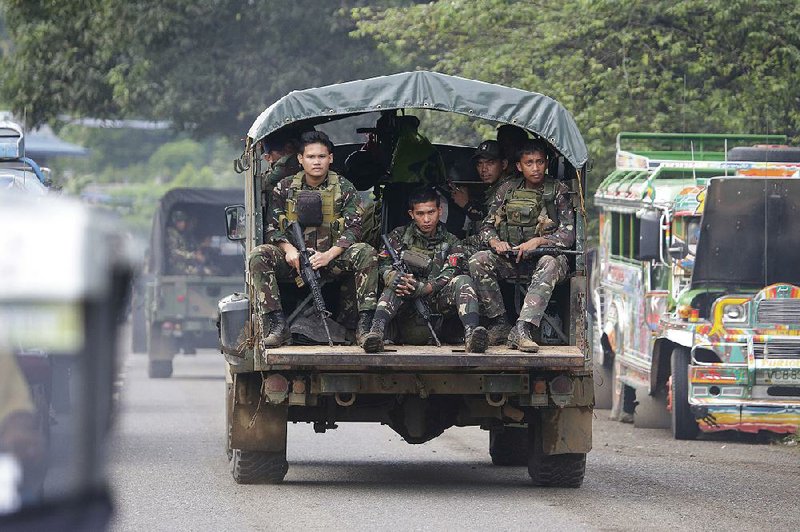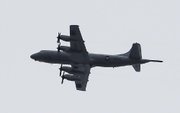ILIGAN, Philippines -- U.S. special forces are assisting Philippine troops in their operations against Islamic militants in the southern city of Marawi, the U.S. Embassy said Saturday in Manila.
Also Saturday, 13 Philippine marines were killed in what Philippine officials said was the greatest single-day loss for government forces since the start of the nearly three-week siege.
As the battle in Marawi raged Friday, U.S. Navy aircraft provided surveillance for the troops, confirming the involvement of the U.S. military in helping to end the urban insurrection by Maute and Abu Sayyaf militants at the request of the Philippine government.
"We don't have adequate surveillance equipment, so we asked the U.S. military for assistance. It's noncombat assistance," military spokesman Brig. Gen. Restituto Padilla said by phone, citing a Philippine government policy that bars foreign troops from on-the-ground combat.
An Associated Press journalist and photographer saw a U.S. Navy P-3 Orion plane hovering in cloudy skies above Marawi on Friday. The aircraft flew above rocket-firing Philippine helicopters that struck militant positions, causing plumes of smoke to billow skyward.
The U.S. Embassy in Manila said Saturday that as a result of the request, "U.S. special operations forces are assisting the [Philippine military] with ongoing operations in Marawi."
"The United States is a proud ally of the Philippines, and we will continue to work with the Philippines to address shared threats to the peace and security of our countries, including on counterterrorism issues," the embassy added.
The embassy declined to provide further details, citing the sensitivity of the operation.
Philippine Defense Secretary Delfin Lorenzana and President Rodrigo Duterte's spokesman, Ernesto Abella, didn't respond to calls and text messages seeking comment.
Philippine marines were conducting a house-to-house search for militants allied with the Islamic State extremist group who are still occupying parts of Marawi when the battle broke out Friday, said Lt. Col. Jo-ar Herrera, spokesman for the Philippine army's 1st Infantry Division.
As many as 40 militants used civilians as shields, making it hard for troops to operate, and positioned themselves in the city's many mosques.
Herrera also said 40 marines were wounded.
Philippine military officials say the violence has left at least 138 militants and 58 government troops dead. At least 21 civilians have been killed, including a boy who was hit by suspected militant gunfire inside a Marawi mosque where his family had taken refuge, Padilla said.
Hundreds of thousands of people have fled the city, parts of which were reduced to rubble by fighting and government airstrikes in an attempt to dislodge the rebels.
"This temporary setback has not diminished our resolve a bit," military spokesman Col. Edgard Arevalo said. "It instead primed up our determination to continue our prudent advances to neutralize the enemy, save the innocent lives trapped in the fight, and set the conditions for the rehabilitation and reconstruction of Marawi."
Elsewhere Friday, Philippine forces captured the mother of two top militant leaders in the Marawi attack. Ominta Romato Maute, who is also known as Farhana, was arrested with two wounded men and several women with assault-style rifles and other weapons in Masiu town in Lanao del Sur province, officials said.
Maute's husband, Cayamora, was arrested Tuesday at a police checkpoint in the southern city of Davao. The two were detained on accusations of providing financial and other support to their children who are involved in the fighting in Marawi, officials said.
The Maute brothers have been linked to a series of bombings in the restive south, including one targeting a night market in Duterte's southern hometown that killed 15 people in September.
On Saturday, Herrera said there was a "strong indication" that the Maute brothers, Abdullah and Omarkhayam, were killed in the fighting Friday.
"We are still validating those reports," he said. No further information was available.
Duterte has declared martial law in the Mindanao region, the southern third of the Philippines and home to a decadeslong Muslim separatist rebellion.
Lorenzana, the designated administrator of martial law, has ordered the arrest of nearly 200 militants, politicians and other suspected civilian backers of the uprising in Marawi, the heartland of Islamic faith in the south of the predominantly Roman Catholic nation.
The Marawi siege ensued after a May 23 army raid that failed to capture a top terror suspect, Isnilon Hapilon, who has been designated by the Islamic State as its leader in Southeast Asia. Military officials say, however, that the raid pre-empted a plot by hundreds of militants waving Islamic State group-style black flags to capture Marawi and kill Christians.
The request for U.S. assistance came eight months after Duterte suggested he would end joint military drills with the U.S., after former President Barack Obama's criticism of the extrajudicial killing of thousands of people in the war on drugs that human-rights advocates say has disproportionately targeted the urban poor.
President Donald Trump, on the other hand, has refrained from criticizing Duterte and even invited him to the White House when the two leaders spoke by phone in April. Trump more recently was reported to have praised Duterte's efforts in the war on drugs.
Officials at a regional security conference in Singapore last weekend voiced concern over the rising threat from Islamic fighters in Southeast Asia, home to about 15 percent of the world's 1.57 billion Muslims.
U.S. Defense Secretary James Mattis sought to reassure allies in the region, highlighting U.S. efforts to improve information sharing and to train Philippine counterterrorism forces fighting in the south.
Duterte has pledged "harsh" actions against Islamic militants, especially in poorer southern provinces. Between 250 and 400 foreign fighters are believed to be operating in the Philippines, according to Philippine Undersecretary for Defense Ricardo David.
Information for this article was contributed by Todd Pitman, Jim Gomez and Aaron Favila of The Associated Press; by Ian Sayson, Andreo Calonzo and Anna Edgerton of Bloomberg News; and by Felipe Villamor of The New York Times.
A Section on 06/11/2017


